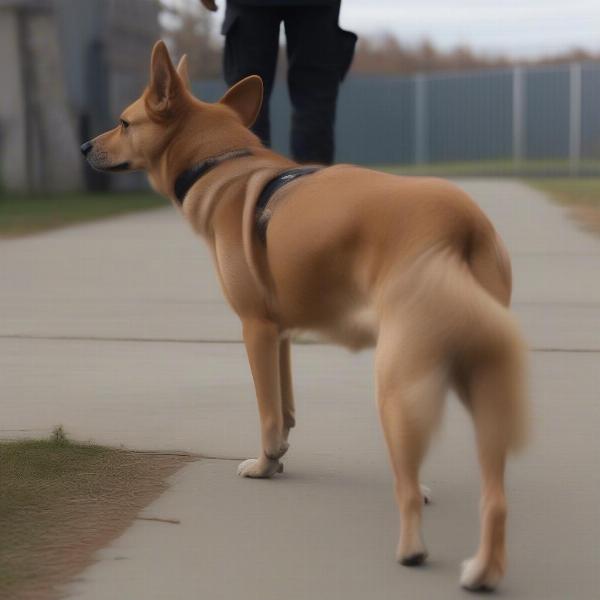Does your dog seem to react differently to people of certain races? It’s a disturbing thought, leading many owners to search “my dog is racist.” While dogs aren’t capable of racism in the human sense, they can develop fear or reactivity towards unfamiliar appearances, including people of different ethnicities. This behavior isn’t inherently prejudiced, but rather stems from a lack of socialization or negative past experiences. Understanding the root cause is the first step towards addressing this challenging behavior.
Why Does My Dog React Differently to Some People?
Dogs rely heavily on visual cues. If a dog hasn’t been exposed to a diverse range of people during their crucial socialization period (typically up to 16 weeks old), they might react with fear or suspicion towards unfamiliar appearances, be it different clothing, hairstyles, or racial characteristics. This isn’t racism, but rather a learned fear response.  Dog reacting to a stranger
Dog reacting to a stranger
Similarly, a negative experience with someone of a particular appearance can create a negative association. For example, if a dog was startled by a person wearing a hat, they might become wary of everyone wearing hats. This fear can generalize to people with similar features. is my dog racist
Is It Really Racism or Something Else?
While the term “racist dog” is often used to describe this behavior, it’s important to remember that dogs don’t understand the complex social constructs of race and prejudice. Their reactions are driven by instinct and learned associations. A more accurate term is “fear-based reactivity” or “stranger danger.” why is my dog racist
“Dogs react to what they perceive as different, not to race itself,” says Dr. Emily Carter, a certified applied animal behaviorist. “Early socialization and positive reinforcement are key to preventing and managing this behavior.”
How Can I Help My Dog Overcome This Reactivity?
Addressing this behavior requires patience and consistency. Here’s a step-by-step guide:
- Socialization: Gradually expose your dog to a diverse range of people in a controlled and positive environment. Start with short, supervised introductions at a comfortable distance and reward calm behavior with treats and praise.
- Positive Reinforcement: Reward your dog for calm and appropriate behavior around people of different appearances. Use high-value treats and enthusiastic praise to create positive associations.
- Counter-Conditioning: Pair the presence of the feared stimulus (e.g., a person of a different ethnicity) with something positive, like a favorite toy or treat. This helps change your dog’s emotional response from fear to happiness.
- Desensitization: Gradually expose your dog to the feared stimulus at a distance and intensity that doesn’t trigger a reaction. Slowly decrease the distance and increase the intensity as your dog becomes more comfortable.
- Seek Professional Help: If your dog’s reactivity is severe or you’re struggling to manage it on your own, consult a certified dog trainer or veterinary behaviorist. They can provide personalized guidance and develop a tailored training plan.
why does my dog bark at black people
What to Avoid
- Punishment: Punishing your dog for reactive behavior will only worsen their fear and anxiety.
- Flooding: Exposing your dog to the feared stimulus too quickly or intensely can be overwhelming and counterproductive.
“Patience is crucial,” adds certified dog trainer, Mark Johnson. “It takes time and effort to change learned behaviors, but with consistent training and positive reinforcement, you can help your dog become more comfortable and confident around all people.”
Conclusion
While the notion of a “racist dog” is misleading, dogs can display fear-based reactivity towards unfamiliar appearances. Addressing this behavior involves understanding its root cause and implementing positive reinforcement, counter-conditioning, and desensitization techniques. With patience and consistency, you can help your dog overcome their fear and become a well-adjusted and accepting companion. best boxer dog food
FAQ
- Q: Can dogs be truly racist? A: No, dogs don’t understand the concept of race. Their reactions are based on learned associations and fear.
- Q: How can I socialize my adult dog? A: Gradual and positive exposure to different people and environments is key, along with rewarding calm behavior.
- Q: When should I seek professional help? A: If your dog’s reactivity is severe or you’re having difficulty managing it, consult a certified trainer or behaviorist.
- Q: How long does it take to change this behavior? A: It varies depending on the dog and the severity of the reactivity, but consistency is key for success.
- Q: Is it my fault my dog is reactive? A: Not necessarily. Many factors can contribute to reactivity, including genetics, early experiences, and lack of socialization.
why is my older dog panting so much
ILM Dog is your trusted international resource for expert advice on dog care and training. We offer comprehensive guidance on breed selection, health, behavior, nutrition, grooming, and much more. Whether you’re a new dog owner or a seasoned expert, ILM Dog provides valuable insights and practical tips to help you nurture a happy and healthy canine companion. Contact us for personalized advice: Email: [email protected], Phone: +44 20-3965-8624. Visit ILM Dog for more information.